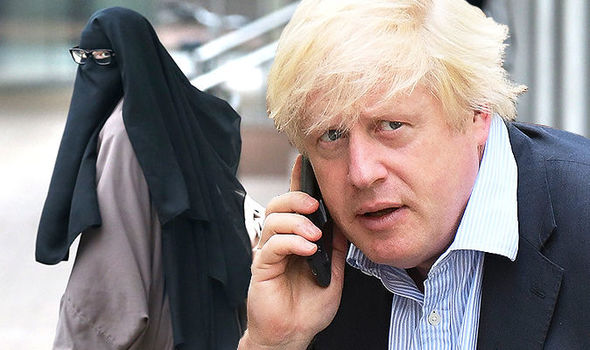The newly appointed British Prime Minister Boris Johnson has snubbed the British opposition by refusing to apologise for his comments regarding the practice of wearing burqas. Boris Johnson had earlier said that women who wear burqas look like ‘letterboxes’ and ‘bank robbers’. Brandon Lewis had called on the former Foreign Secretary to say sorry for the comments. Boris’s comments came as several criminal incidents where burqa was used as a way to avoid identification had surfaced. Several men were also caught making use of burqas to hide their identities.
Boris Johnson had made these comments during his tenure as the foreign secretary last year. An independent panel was also constituted to investigate the former British foreign secretary’s comments after he had suggested that women wearing the burqa looked like letter boxes or bank robbers in his Daily Telegraph column. While the comment didn’t go down well with radicals and pseudo-liberals in Britain, the panel had indicated that he was “respectful and tolerant” and was fully entitled to use “satire” to make his point in his column . Boris Johnson had said the burqa was “oppressive” and it was “absolutely ridiculous that people should choose to go around looking like letter boxes”.
While women around the world fight against imposition of burqa, pseudo-liberals around the world have unsuccessfully tried to portray it is some sort of sign of liberation. Over the past few years Britain has also been regressing into justifying and propagating practices like forced full body cover for women in a bid to cater to its radical population. Moreover, political correctness has overshadowed real issues under the pretext of being ‘xenophobic’ ‘racist’ and other things. However, Boris Johnson staying with his comments firmly is surely a refreshing change.
Recently, Danish parliament had also brought all political parties to almost on a common page, where all parties collectively decided to ban burqa. However, this ban is termed as a ban on masking rather than a ban on religious clothing as said by Jacob Ellemann Jensen, spokesperson for the Liberal Party, which is the largest party in the coalition government in Denmark.
Earlier, similar such bans on masking have taken place in other European countries like, Austria, France, and Belgium where France was the first country to ban it in year 2011.
However, people with contrary thoughts term this decision as been deliberately taken to target Muslim culture, since there is no ban on turban, scarfs, or kippas (traditional Jewish cap). However, the question remains. How a piece of cloth that covers a woman from top to bottom has any concern with devotion or culture? This is more like a glaring example of patriarchy where the men in the society set dressing rules for womenfolk. Nonetheless this archaic dictate around women dressing is just one link in the long chain of oppressive practices that continue to haunt women around the world.























